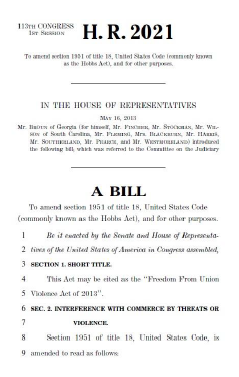Argument preview: Proving the federal criminal “element” of affecting commerce

on Feb 17, 2016 at 8:19 am
The Supreme Court presumably granted review in Taylor v. United States (scheduled for argument on Tuesday, February 23) to perform the “housekeeping chore” of settling a circuit split: whether the government must prove, in every Hobbs Act prosecution involving drug-dealer robberies, facts showing that the defendant’s conduct (to quote the statute) “in any way or degree obstructs, delays or affects commerce … or attempts to do so.” The case, however, might turn out to be a “sleeper” with far broader implications than seem apparent at first. And Justice Antonin Scalia’s untimely absence might well affect the course of the decision, as well as oral argument.
Drug-dealer robberies, a cottage (interstate?) industry
Criminal cases often open a window onto parts of society that most regular SCOTUSblog readers do not experience. It turns out that robbing illegal narcotics dealers (or individuals perceived to be such dealers) is a not-infrequent crime. Robbers target drug dealers because drug dealers (a) often stockpile cash as well as readily saleable drugs and consumer goods; and (b) are unlikely to call in the assistance of law enforcement. So in this case: David Taylor and others were members of the “Southwest Goonz,” a gang in Virginia that regularly conducted home-invasion robberies of drug dealers. In the two robberies involved here, though, no drugs were actually found, and little of value – two cellphones, some jewelry, and forty dollars in one, and one cellphone in the other – was taken.
Taylor and co-defendants were indicted on federal charges of violating the Hobbs Act, which imposes substantial penalties on “robbery or extortion” (as well as attempts and conspiracies to do so). In order to establish federal jurisdiction over such acts, the statute expressly reaches only a person “who[] in any way or degree obstructs, delays, or affects commerce or the movement of any article or commodity in commerce.” It is the federal jurisdictional “hook” of affecting commerce that is at issue in this case.
The proceedings below
In Taylor’s first trial the jury was “hung,” and a note it sent out suggested that jurors were concerned about the issue of “interstate commerce” because the marijuana involved might have been grown within Virginia. Thus, before the retrial, the government asked the court to exclude any defense evidence suggesting that robbing dealers of “Virginia-grown [that is, in-state] marijuana” would not violate the Hobbs Act. The court agreed, and no evidence of where the targeted marijuana may have been grown or was headed was introduced. But Taylor now argues that the evidence failed more broadly, asserting that the government offered no evidence not only that the targeted marijuana travelled in interstate commerce, or that the targeted dealers (or defendants) did, but also no evidence that the small items taken in the robberies actually “affected” interstate commerce at all.
In response to that argument, the Fourth Circuit ruled in Taylor’s appeal that all “drug dealing is a commercial enterprise,” and that all drug-dealer robberies affect business “that plainly is both economic and interstate.” Thus, the court said, all that Taylor’s jury had to find was that drug dealers were in fact the target of Taylor’s robberies.
These broad statements by the Fourth Circuit were, as the federal government noted in opposing certiorari, “in tension” with rulings of the Second and Seventh Circuits, which seemed to hold that in order to convict, a jury must be offered some case-specific evidence of effect on interstate commerce, beyond “the mere fact that the robberies target drug trafficking proceeds.”
The issues for argument now
The Fourth Circuit’s opinion in this case was unpublished, and the government was apparently in no hurry to address Taylor’s petition for certiorari, having taken some nine extensions (from October 2014 until July 2015) to file its typed opposition. Perhaps the case was viewed as, and will be, an easy one. But I can perceive some broader, undeveloped issues that may raise the profile of the case by Term’s end – and which arise at least in part from two leading opinions written by the late Justice Antonin Scalia (whose passing is sure to be mourned repeatedly in the coming months, as decisions he authored are invoked to influence a number of pending cases).
Moreover, it is sometimes said among criminal appellate specialists that a less-than-illuminating defendant’s brief is often the defendant’s best friend, as it propels some appellate judges (and their clerks) to actually become stronger advocates for the defendant’s position. Whether intentional or otherwise, Taylor’s briefing here might test that adage. Although Taylor’s petition presents only one question, it seems to me that it subsumes three discrete issues:
First, is it a defense to a Hobbs Act prosecution that the object of a robbery – here marijuana — was produced or used only “in state”? On this question, the federal government presents an answer that seems inarguable: no. After the Court’s 2005 decision in Gonzales v. Raich – which held that the Constitution’s interstate Commerce Clause permits Congress to reach, criminally, even home-grown marijuana – whether the commercial objects of a Hobbs Act robbery are “in state” or interstate would seem to be irrelevant. As Justice Scalia’s concurrence in that six-to-three decision made clear, “[w]here necessary to make a regulation of interstate commerce effective, Congress may regulate even those intrastate activities that do not themselves substantially affect interstate commerce.” Even if the Court wished to reconsider Raich – and there is no real indication that it does – this undeveloped case would not be the right vehicle.
However, another Scalia opinion, not cited at all by Taylor, seems to necessarily raise a second question here: must the government prove in every case that the defendant’s conduct “affects commerce,” or may that effect be presumed merely from fact that the victims were drug dealers (while invoking the Raich idea that all drug dealing affects commerce)? More broadly, must Hobbs Act prosecutions include some “particularized evidence” of the effect (or potential effect) of the robbery on commerce, in every individual case? In his 1995 decision for a unanimous Court in United States v. Gaudin, Justice Scalia wrote that the answer to a similar question was “simple”: a criminal jury must find the defendant guilty on all elements of a crime, and if “materiality” is an element, then the government must introduce evidence proving even that “legal” element in every case. Prior to Gaudin, the courts of appeals had routinely held that materiality was a “legal” issue for judges to decide, not juries. Gaudin’s conclusion, that even “legal” elements must be proved, meshes with Justice Scalia’s later development of the “sentencing element” theory of due process in Apprendi v. New Jersey (which he engineered) and Blakely v. Washington. Gaudin, like Apprendi, changed the accepted practice for federal prosecutors and judges alike.
The “sleeper” issue in this case, then, is whether Gaudin and similar cases require the jury to find, and thus the government to prove in every case, the “affects commerce” element of the Hobbs Act – and even more broadly by extension, the similar interstate commerce element found in dozens, even hundreds, of other federal criminal statutes. Justice Scalia’s forceful presence and views on this issue, if this case ultimately reaches it, will be sorely missed.
On this second issue, the government’s brief (which mentions Gaudin even though Taylor did not) argues that the “affects commerce” element should be subdivided into a factual aspect, for the jury, and a “purely legal” aspect which courts may presume. Thus, whether Taylor sought to rob a drug dealer is a factual inquiry for the jury. But whether the robbery of drug dealers always “affects commerce” is, says the government, a legal issue which may, in light of Raich, be presumed in every case. Yet it can readily be argued that whether an act actually “affects commerce” is a factual question, and the government’s subdividing argument on this point sounds significantly like the same “factual-purely legal elements” argument that the Court rejected in Gaudin.
The final issue
A third issue apparently presented in this case – once we settle what the elements of a Hobbs Act prosecution are – is whether the evidence in Taylor’s case was “sufficient” to prove that his acts “affected commerce.” Here the government offers two arguments, even if proof of such an effect is required in every case. First, the evidence here showed that the defendants “affected commerce” by “depleting the assets” of drug dealers, a theory that most lower courts have accepted to prove Hobbs Act violations. And second, the evidence showed that “exotic” marijuana was the object of the robberies, and the jury could reasonably infer that “exotic” meant “out of state.”
Given the difficult implications of the second issue described above, one can imagine the Court taking “the easy way out” by just assuming an answer to the “is it an element for the jury” question, without deciding it, and then ruling that the evidence here was factually sufficient in any case. When sufficiency is the issue, the constitutional inquiry sets a very low standard: whether any rational jury could have found, based on the evidence and all “reasonable inferences” from that evidence, that the elements were proved beyond reasonable doubt. One perhaps extreme example of that concept are many court of appeals cases holding that, when robbery of a federally insured bank is charged, a conviction may be upheld based solely upon inferences drawn from the word “federal” or “national” in the bank’s title, even when no direct evidence of federal insurance was introduced.
Whether the Court will find these arguments satisfying – or even relevant given Taylor’s silence on some of them – must wait for oral argument, or the decision itself later this spring. But one thing seems certain: we will miss Justice Scalia’s spirited, witty, and often unnerving questions when the parties spar next Tuesday.



